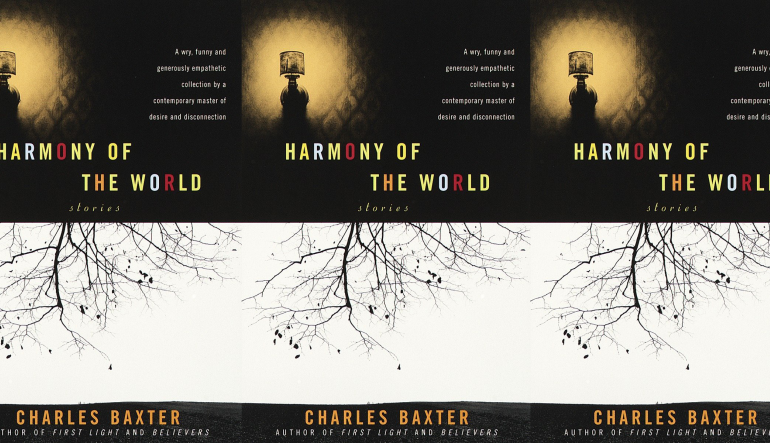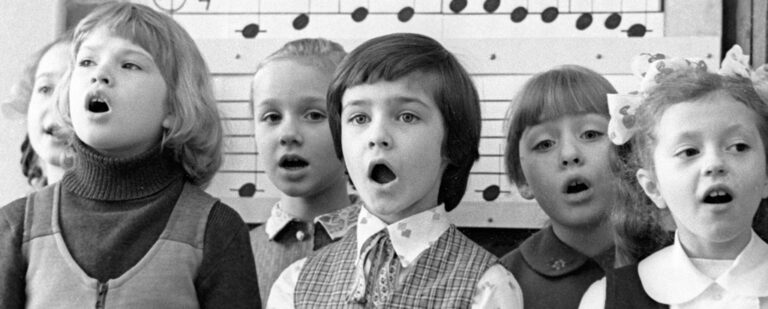
Guest post by Greg Schutz
In “Gershwin’s Second Prelude,” the first story in
Charles Baxter‘s first book, the 1984 collection
Harmony of the World, the elderly piano instructor Madame Gutowski leans back to admonish Kate, her pupil. “Now listen,” she says. “You children think you are so new with your misery, with your morphia. Pain always seems new when you have it.”
An extraordinary thing to say, isn’t it? Who talks like this nowadays? Kate might rightly ask herself. Similarly, we as readers might ask ourselves, Who writes characters who talk like this nowadays? Madame Gutowski’s statement is not mere eccentricity, but the harbinger of something more frigid and otherworldly, the arrival of a new and difficult-to-describe presence in the room.
Kate has arrived for her piano lesson drunk: Wiley, her heroin-addicted boyfriend, has left her. In customary Baxter fashion–his characters are often noteworthy for their blind spots, the products of the competition between their desire to believe the world is a certain way and their knowledge, often suppressed, that it is not–Kate doesn’t learn of Wiley’s addiction until after they have moved in together; one afternoon, she discovers “a hypodermic needle in the medicine cabinet, hidden behind Wiley’s electric shaver.”
In a different story, this would be the story. What will Kate do next? Will she throw him out or try to help him? We await the confrontation, and her decision. After all, such confrontations and decisions are the stuff of which traditional narrative fiction is made.
But the confrontation that Baxter gives us is brief, and the decision it leads to isn’t Kate’s: Wiley is the one who decides to move out. (And even that occurs in an unsatisfying fashion, without release or resolution: “‘Oh no,’ [Wiley] said. ‘No. I don’t ever explain.'”) And a few pages later, what another author’s story would be about is summarily dismissed with a wave of an old Polish woman’s hand. Your misery, your morphia.
Madame Gutowski is a fitting ambassador from the world of Charles Baxter’s short fiction. Among his stories, “Gershwin’s Second Prelude” is representative in its strangeness, if such a thing can ever be said to be the case. In the story’s close, the misery and the morphia of the world outside Madame Gutowski’s studio are swept aside in a bizarre ceremony, an imaginary toast. “Kate watched the old woman prop herself on her cane, as her right hand lifted into the air, the thumb and forefinger holding an invisible glass.”
What is in that glass?
The answer, I’d argue, is not nothing. Baxter–and here I’ll go ahead and say what I meant to say before when I said frigid and otherworldly, even if it’s a word I might normally regard somewhat dubiously in this context–is a writer uncommonly concerned with the spiritual.
* * *
Fittingly, Baxter’s landscapes, too, exist on what I might as well call, now that I’ve let the cat out of the bag, the spiritual plane. Animism tinges his non-human world. “Inanimate objects liked to hide,” muses Irene in “Time Exposure” when she finds her reading glasses inside a box of tissues. Earlier, investigating a crack in the bathroom wall, she finds the razor blades her husband has discarded through the slot in the medicine cabinet: “She hated the look of the dull blue metal. It made her shy.”
It made her shy. When Irene looks at the razor blades, Baxter’s razor blades look back.
In his essay “
Talking Forks: Fiction and the Inner Life of Objects,” Baxter describes a scene from Turgenev’s
Home of the Gentry, interpreting it thusly: “Lavretsky has given away some of his emotional and intellectual autonomy, and suddenly the things surrounding him have their own thoughts and feelings–not necessarily his–and in his reduction of the human scale, Lavretsky’s misery disappears.”
This description could just as easily be applied to the close of Baxter’s story “Surprised by Joy.” Harriet and Jeremy, about half a year removed from the death of their young daughter, are visiting the
D.H. Lawrence shrine near Taos. Jeremy is still wracked with grief; Harriet, meanwhile, has begun–mysteriously, even to herself–to recover.
She took Jeremy’s hand and scanned the clouds in the west, the Sangre de Crísto Mountains to the east, trying to see the sky, the beckoning clouds, the way he did, but she couldn’t. All she could see was the land stretched out in front of her, and, in the far distance, all fifty miles away, a few thunderheads and a narrow curtain of rain, so thin that the light passed straight through it.
This is not the
pathetic fallacy at work, nor is it an
objective correlative. Baxter’s fictional landscape does not helplessly reflect its observer. Instead, intent and inhuman, it looks back. Harriet tries “to see the sky . . . the way he did”–in other words, to view the panorama through the lens of her loss–but cannot. What happens instead? The “reduction of the human scale”: the land speaks.
A similar movement occurs at the end of Chekhov’s story “
Gusev.” What we think the story is about, and what a lesser story
would be about–Gusev’s misery as he lies dying in the hold of Russian freighter on a journey from the Far East back to Odessa, his fervent desire to return home in conflict with his body’s inexorable deterioration–is discarded in the final section. Gusev dies and, in death, shrinks, becoming just another member of the animate but inhuman world: “Sewn up in the sailcloth, he looked like a carrot or a horse-radish . . .”
But Chekhov does not stop here. We follow Gusev’s shrouded body as it is dumped overboard and sinks, but the story loses interest with the body as an object–it is one of the weights sewn into the sailcloth, not the body, that we ultimately follow toward the bottom of the sea. And then something miraculous happens. When we return to the surface, Gusev’s ship is gone. There are no humans in sight, only the immense natural world. Compare Chekhov’s ending to Baxter’s:
There came a great beam of green light transpiercing the clouds and stretching to the center of the sky, and a little while later a violet-colored beam lay beside it, and then there was a golden beam, and then a rose-colored beam. The heavens turned lilac, very soft. Gazing up at the enchanted heavens, magnificent in their splendor, the sea fumed darkly at first, but soon assumed the sweet, joyous, passionate colors for which there are scarcely any names in the tongue of man.
Again, the panorama that speaks, and the corresponding reduction of the human scale. In both stories, there is a voice from the heavens, but its words are not for human ears. They can’t be adequately captured by “the tongue of man.”
No misery here, no morphia, just the sea and the sky.
* * *
I’m reminded of the closing line of William Maxwell’s story “
The Thistles in Sweden“: “and I think if it is true that we are all in the hand of God, what a capacious hand it must be.”
It’s a thought that threatens first, before it comforts. All things, Maxwell’s narrator suggests, are gathered up by the capacious hand of God–and his story, which consists of a catalogue of the objects that have accreted around his family over the years, includes not only the benign and the mundane but the tragic and the menacing as well. That range is why the hand of God must be so capacious. And here, in turn, lies the comfort. Range, capacity, size: the reduction of the human scale. When all our lives are gathered up–whether in the palm of a hand or the bell of an invisible wineglass–our perspective shifts. Looking upon ourselves as if from afar, we are put in our place.
And wouldn’t Maxwell’s narrator recognize Charles Baxter’s haunted fictional landscape immediately? Both authors are concerned with eloquent objects, living landscapes.
“Is the wind, then, an animal that breaks loose from its chains?” a sick soldier scoldingly asks Gusev early in the story. “You should have a head on your shoulders and try to reason things out. You don’t have any brains!”
Pavel Ivanich is right, I think, to be suspicious of Gusev’s anthropomorphism. He is wrong, however, to suggest
reason and
brains as the solution: his cure is just as anthropocentric as Gusev’s disease. There is a god present in all the passages I’ve been citing, but it may not be a god we would recognize–more of a Spinozan deity, I think. The landscape doesn’t speak our language. It is an immense
other. Baxter’s characters, like
many of Maxwell’s, like Gusev, like Lavretsky–and like Ruth and her aunt Sylvie in
Marilynne Robinson‘s
Housekeeping, or the narrator, his father, and his brother Paul in Norman Maclean’s
A River Runs Through It–are surrounded by
Natura naturans.
* * *
From the closing paragraphs of Baxter’s “Gershwin’s Second Prelude”:
“Raise glass!” Madame shouted.
“Stand!”
Kate stood and after a moment hoisted her right hand, thumb and forefinger in a circle broken by a gap for the invisible stem, until the glass that was not there had reached the level of her shoulder. The old woman, seeing that she had done so, suddenly shot her an utterly fierce and impersonal smile.
Physically, nothing very dynamic is happening here, and the physical crisis of the story–Kate’s empty apartment, Wiley’s departure–is not about to be resolved. Meanwhile, Kate’s emotional response is being held in suspension by a kind of bemused stillness. Charles Baxter’s stories are full of moments like this–when we sense, beneath the physical and the emotional stillness, a mysterious something else churning to the surface.
In situations like these,
reason and
brains fail. The mysterious something else in Baxter’s stories often moves his characters away from fully knowable emotional states and toward irrational and possibly inexplicable physical actions. They fire pistols at nuclear reactors (“Westland”). They stand barefoot on frozen lakes (“
Snow“). They lie awake at night, helplessly picturing the demolition of a building full of people (“The Next Building I Plan to Bomb”). They lie naked on their lawns in the rain (“Saul and Patsy are Pregnant”–indeed, Saul does this as a reaction to what Baxter calls “pure spiritual fright”). Caught, deeply in the grips of
something, they drink imaginary wine.
These characters are often lonely, often hyper-aware of the
otherness of the world surrounding them, and their awareness of this otherness separates them from other characters, who seem less aware. And then there is the vortex of empathy and alienation that is Baxter’s story “Mr. Scary,” from
the current issue of Ploughshares, in which Estelle, in many ways an outsider-figure of the type I’m describing, is also uncomfortably aware of the otherness of a grandson who is hyper-aware of the otherness of others.
But the hand of god is capacious, and if Estelle is upset by her grandson’s refusal to connect, then she is also still striving, in the end, to love him. She cannot
not care. Similarly, at the end of “
Fenstad’s Mother,” Fenstad, the somewhat sheepishly religious son of an atheist mother, is still offering “prayers of remembrance and thanksgiving” for his ailing mother, “even though he knew she would disapprove.” Cooper, in “Shelter,” struggles mightily to connect with a few of the local homeless persons in his community–and does not entirely fail. And Saul, though he lies naked and weeping in his yard, does not weep out of sadness.
* * *
“‘Drink!’ she commanded. Kate watched her, then drank.”
And this is where we leave them, Kate and Madame Gutowski. Physically, nothing has been resolved, and we cannot guess enough of Kate’s emotional state to find our resolution there, either. And yet, somehow, everything that is truly important to the story has been settled.
How does this happen? The secret is sloshing inside those wineglasses. Not nothing, no: the wine is both there and not-there. As in transubstantiation, it is brought into being by belief. Drinking it, Kate and Madame Gutowski are participating in a ritual that connects them to the spiritual world–a world that, in its limitless capacity and its reduction of the scale of Kate’s suffering, offers a balm for the misery and morphia of the mundane human sphere to which much of our contemporary literature confines itself.
This is Greg’s first post for Get Behind the Plough.



